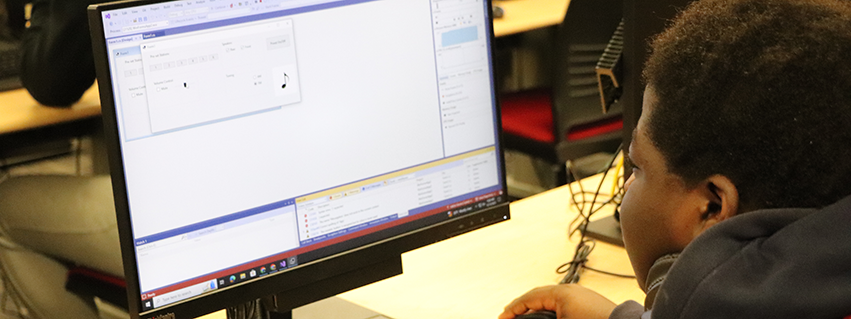
Game Design & Programming
This program is offered for juniors and seniors. It introduces students to the game development process from storyboarding the initial concept to the final marketing documentation. During this program, students will utilize multiple game development methodologies to move a project through the major stages of game design with each student assuming one or more of the development team roles.
Student will also explore the tools, platforms and techniques required to develop applications for highly mobile and compact devices. Mobile applications will be designed, developed, tested and deployed that provide computing services to the mobile user.
Throughout this program students will survey the main components of the business systems cycle. The five phases of the systems development life cycle (SDLC) (systems planning, system analysis, systems design, systems implementation and system operation and support) will be investigated.
Program Overview
Course Information
Program Location
Davenport University (Shuttle Available)
Session Offered
AM only
Average Lecture Days/Week
4-5 days
Average Lab Days/Week
4 days
Homework
Weekly
Required Reading
- College level textbooks
- 25 or more pages per week
Success Indicators
- Familiar with basic computer and application skills to solve business problems
- Detailed orientated
- Analytical thinker
- Action oriented
- Dependable
- Effective in a team setting
College Credits - 12
- CISP 111 - Requirements Planning and Development
- CSCI 231 - Introduction to Programming
- CSCI 258 - Introduction to Game Design and Theory
- Mobile Applications Development
Academic Rigor
4 out of 5
Capital Region Technical Early College
Students enrolled in this program may choose to participate in the Capital Region Technical Early College program (CRTEC). This is a high school to college program where students start in grade 11 and leave in grade 13 with a college degree or certification. This program gives students relevant career related experience.
Course Outcomes
Students learning outcomes include, but are not limited to:
- Describe the game development process from pre production to post production
- Demonstrate the use of prototyping and storyboarding in the development of a game
- Describe software troubleshooting and debugging techniques
- Describe the team roles required to support the development of a game
- Demonstrate the ability to create a budget that reflects the estimated work required to complete the project
- Configure a mobile application development environment
- Discuss the software architecture and design principles of mobile applications
- Design, implement and test mobile applications
- Design appropriate user interfaces for varying screen sizes and orientations
- Discuss security and privacy implications relative to application development
- Use the C# language for structured and interactive programming
- Demonstrate the knowledge of input and output on a program
- Describe how systems analysts interact with users, management, and other information systems professionals in a typical business environment
Certifications
None
Student Leadership
Students have the opportunity for leadership, competition and community service through membership in DECA.
Career Outlook
Careers
- Graphic Designer
- Software Developer
- Video Game Designer
- Computer Network Architect
- Web Developer
Median Wage
- Graphic Designer: $28.32 Hourly, $58,910 Annually
- Software Developer: $63.59 Hourly, $132,270 Annually
- Video Game Designer: $47.37 Hourly, $98,540 Annually
- Computer Network Architect: $62.42 Hourly, $129,840 Annually
- Web Developer: $40.84 Hourly, $84,960 Annually
Employment Outlook (Average)
- Graphic Designer: 2-4%
- Software Developer: 9% or higher
- Video Game Designer: 9% or higher
- Computer Network Architect: 2-4%
- Web Developer: 9% or higher

